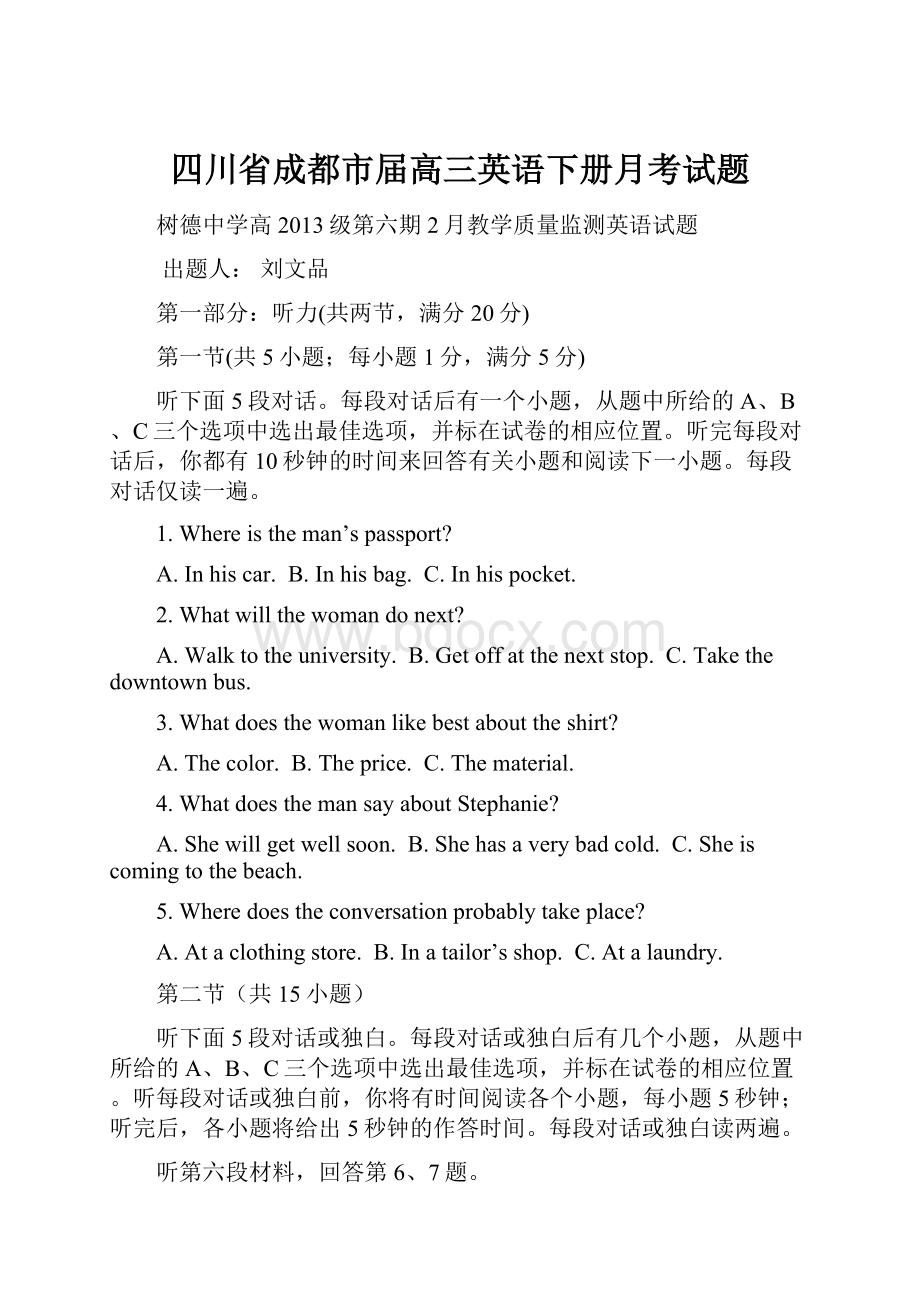四川省成都市届高三英语下册月考试题.docx
《四川省成都市届高三英语下册月考试题.docx》由会员分享,可在线阅读,更多相关《四川省成都市届高三英语下册月考试题.docx(18页珍藏版)》请在冰豆网上搜索。

四川省成都市届高三英语下册月考试题
树德中学高2013级第六期2月教学质量监测英语试题
出题人:
刘文品
第一部分:
听力(共两节,满分20分)
第一节(共5小题;每小题1分,满分5分)
听下面5段对话。
每段对话后有一个小题,从题中所给的A、B、C三个选项中选出最佳选项,并标在试卷的相应位置。
听完每段对话后,你都有10秒钟的时间来回答有关小题和阅读下一小题。
每段对话仅读一遍。
1.Whereistheman’spassport?
A.Inhiscar.B.Inhisbag.C.Inhispocket.
2.Whatwillthewomandonext?
A.Walktotheuniversity.B.Getoffatthenextstop.C.Takethedowntownbus.
3.Whatdoesthewomanlikebestabouttheshirt?
A.Thecolor.B.Theprice.C.Thematerial.
4.WhatdoesthemansayaboutStephanie?
A.Shewillgetwellsoon.B.Shehasaverybadcold.C.Sheiscomingtothebeach.
5.Wheredoestheconversationprobablytakeplace?
A.Ataclothingstore.B.Inatailor’sshop.C.Atalaundry.
第二节(共15小题)
听下面5段对话或独白。
每段对话或独白后有几个小题,从题中所给的A、B、C三个选项中选出最佳选项,并标在试卷的相应位置。
听每段对话或独白前,你将有时间阅读各个小题,每小题5秒钟;听完后,各小题将给出5秒钟的作答时间。
每段对话或独白读两遍。
听第六段材料,回答第6、7题。
6.Accordingtotheman,whatisspecialattheSalvadoranrestaurant?
A.Aspecialdrink.B.Acertainkindofsoup.C.Cornpancakes.
7.WhereisElSalvador?
A.InSouthAmerica.B.InCentralAmerica.C.InthenorthofMexico.
听第七段材料,回答第8、9题。
8.Howdidthemanlearnaboutthejob?
A.Fromanagency.B.FromtheInternet.C.Fromthenewspaper.
9.Whatwillthemanprobablydonext?
A.Learntotypefaster.B.Startworkingrightaway.
C.Pickupanapplicationfromthewoman.
听第八段材料,回答第10至12题。
10.Whatseasondothetwospeakerstalkabout?
A.Autumn.B.Winter.C.Summer.
11.Whatdoesthewomanthinkaboutwatchingmovies?
A.It’ssoexciting.B.It’stooboring.C.It’stooexpensive.
12.Whatdoweknowaboutthewoman?
A.Shehasn’tbeenusedtotheweatherthere.
B.Shewillhaveadatewiththemantonight.
C.Shepaidtoomuchtowatchamovie.
听第九段材料,回答第13至16题。
13.Wherearethespeakers?
A.InLosAngeles.B.InChicago.C.InConnecticut.
14.Whatdoesthewomanfinallybuy?
A.Alightcoat.B.Aheavycoat.C.Awoolcoat.
15.Whatdiscountdoesthewomangetforthecoat?
A.Fivepercent.B.Tenpercent.C.Fifteenpercent.
16.Whatdoesthemanrecommendtothewomanintheend?
A.Somescarves.B.Somegloves.C.Someshirts.
听第十段材料,回答第17至20题。
17.Wherewastheschoollocated?
A.Inthewoods.B.Twomilesfromafarm.C.Inthemiddleofafield.
18.Whatdidallthestudentsbringwiththemtoschool?
A.Books.B.Food.C.Money.
19.Howoldwasthespeakeronhisfirstdayatthatschool?
A.Fifteenyearsold.B.Eightyearsold.C.Sevenyearsold.
20.Whatwasthespeakerconfusedabout?
A.Whytheyhadtoeatoutside.
B.Whysmokingwasnotconsideredbad.
C.Whytheyhadtogotoschoolinsummer.
第二部分阅读理解(共两节,满分40分)
第一节(共15小题;每小题2分,满分30分)
阅读下列短文,从每题所给的四个选项(A、B、C和D)中,选出最佳选项。
并在答题卡上将该选项涂黑。
A
From2008to2013,Americanhouseholdslost$l1trillioninrealestate,savings,andstocks.MorethanhalfofallU.S.workerseitherlosttheirjobsorwereforcedtotakecutsinhoursorpayduringthe recession.Theworstmaybebehindthemnow,buttheshockinglossesofthepastfewyearshavereshapednearlyeveryfacetoftheirlives—howtheylive,work,andspend—eventhewaytheythinkaboutthefuture.
ForCindy,the recession beganwhenherhusbandwasrelocatedtoRhinelander,Wisconsin,byhiscompany,forcingthefamilytomoveinahurry.Thecoupleboughtanewhousebutwereunabletoselltheirtwo-bedroomhomeinBigLake,Minnesota.Withtwomortgages(抵押借款)andtwoyoungchildrentocarefor,Cindycouldn'timaginehowtostretchherhusband'spaychecktokeepherfamilyfed.
Thenshestumbleduponanonline community calledBlotanical,aforumforgardeners,manywithaninterestinsustainability.“ThemoreIreadanddiscussedthesepractices,themoreIrealizedthiswouldhelpnotonlyourbudgetbutalsoourhealth,”shesays.
Cindyadmitsthatbeforethe recession,shewasacitygirlwithnointerestingrowingherowndinner.“Igrewflowersmostly—Ididn’tthinkaboutplantsthatweren’tvisuallyinteresting.”Buttostretchherbudget,shebeganputtinginvegetablesandfruit—everythingfromstrawberrybedstoappletrees—andasherfirstseedlingsgrew,herspiritslifted.Shenolongerthinksofgardeningandmakingherownjamsasjustamoneysaver;they’reagenuinepleasure.“It’sbroughtusclosertogetherasafamily,too,”shesays.Herkidsvoluntarilypitchinwith(主动帮助)thegardenwork,andthefamilycookstogetherinsteadofeatingout.Thefoodtastesbetter—it'sfresherandorganic—andthegardenhandilyfulfillsitsoriginalpurpose:
costcutting.Nowshespendsabout$200to$300amonthongroceries,lessthanhalfofthe$650amonththatsheusedtolayout.
Afterdiscoveringhowresourcefulshecanbeintoughtimes,Cindyisnolongereasilydiscouraged.“It makesmefeelproudtobeabletosayImadeitmyself,”shesays.“Ifeelaccomplished,andI'mmoreconfidentaboutattemptingthingsI'veneverdonebefore.Nowsheavoidsconveniencestoresandhasbegunlearningtoknit,quilt,andmakeherownsoap.“Idon'tthinkIwouldhaveeverbegunthisjourneyifitweren’tforthe recession,”shesays.“Ihaveafeelingthatfromnowon,itwillaffectmyfamily’shealthandhappinessforthebetter.”
21.Welearnfromthefirstparagraphthatthe recession______.
A.hadgreatimpactonAmericans’workandlife.
B.affectedAmericansincertainoccupations.
C.hadonlybroughthugelossesinsavingsand stocks.
D.isoverwithsomeofthelossesrecovered.
22.Whatmadethefamily'sfinancialsituationevenworsewasthatthey_______.
A.movedtoRhinelanderinahurry.B.hadtwochildrentoraise.
C.didn'tknowanyoneinRhinelander.D.couldn'tselltheirhomeinBigLake.
23.Inaddition,Cindyviewsgardeningasagenuinepleasurebecausegardening_______.
A.helpedhercutlivingcostsalmostbyhalf.
B.enabledherto make herownjams.
C.builtupfamilytiesandkids’enthusiasm.
D.enabledhertoknowmoreaboutplants.
24.WhatdoesCindythinkofthedifficulttimesshehasgonethrough?
A.Itgavethecoupleandtheirkidsatoughlesson.
B.Itgaveherconfidenceandoptimism.
C.Itwouldcomeagainandaffectthefamily.
D.Itleftalastingpsychologicalimpactonthefamily.
B
Whenit’sfiveo’clock,peopleleavetheir office.Thelengthoftheworkday,formanyworkers,isdefinedbytime.Theyleavewhentheclocktellsthemthey’redone.
Thesedays,thetimeiseverywhere:
notjustonclocksorwatches,butoncell-phonesandcomputers.That may beabadthing,particularlyatwork.Newresearchshowsonthatclock-basedworkscheduleshindermorale(士气)andcreativity.
Clock-timersorganizetheir day byblocksofminutesandhours.Forexample:
ameeting from 9amto10a.m.,researchfrom10a.m.tonoon,etc.Ontheotherhand,task-timershavealistofthingstheywanttoaccomplish.Theyworkdownthelist,eachtaskstartswhentheprevioustaskiscompleted.Itissaidthatallofusemployamixofboththesetypesofplanning.
What,then,aretheeffectsof thinkingabouttimeinthesedifferentways?
Doesonemakeusmoreproductive?
Betteratthetasksathand?
Happier?
InexperimentsconductedbyTamarAvnetandAnne-LaureSellier,theyhadparticipantsorganizedifferentactivities—from projectplanning, holiday shopping,toyoga—bytimeorto-dolisttomeasurehowtheyperformedunder“clocktime”vs“tasktime.”Theyfoundclocktimerstobemoreefficientbutlesshappybecausetheyfeltlittlecontrolovertheirlives.Tasktimersarehappierandmorecreative,butlessproductive.Theytendtoenjoythemomentwhensomethinggoodishappening,andseizeopportunitiesthatcomeup.
Theresearchersarguethattask-basedorganizingtendstobeundervaluedandunder-supportedinthebusinessculture.Smartcompanies,theybelieve,willtrytobakemoretask-basedplanningintotheirstrategies.
Thismightbeasmallchangetothewayweviewworkandthe office,buttheresearchersarguethatitchallengesawidespreadcharacteristicoftheeconomy:
workorganizedbyclocktime.Whilemostpeoplewillstillprobablyneed,andbe,tosomeextent,clock-timers,task-basedtimingshouldbeusedwhenperformingajobthatrequiresmorecreativity.It’ll make thosetaskseasier,andthetask-doerswillbehappier.
25.Whatdoestheauthor think oftimedisplayedeverywhere?
A.It makeseverybodytime-conscious.
B.If may haveanegativeeffectoncreativework.
C.Itisaconvenienceforworkandlife.
D.Itclearlyindicatesthefastpaceofmodernlife.
26.WhatdidTamarAvnetandAnne-LaureSellierfindintheirexperimentsaboutclock-timers?
A.Theyseizeopportunitiesastheycomeup.
B.Theyalwaysgettheirworkdoneintime.
C.Theytendtobemoreproductive.
D.Theyhavemorecontrolovertheirlives.
27.Whatdotheresearcherssayabouttoday’sbusinessculture?
A.Itdoesnotsupportthestrategiesadoptedbysmartcompanies.
B.Itaimstobringemployees’potentialandcreativityintofullplay.
C.Itplacesmoreemphasisonworkefficiencythanonworkers’lives,
D.Itdoesnotattachenoughimportancetotask-basedpractice.
28.Whatdotheresearcherssuggest?
A.Task-basedtimingispreferredfordoingcreativework.
B.Itisimportanttokeepabalancebetweenworkandlife.
C.Performingcreativejobstendsto make workershappier.
D.Ascientificstandardshouldbeadoptedinjobevaluation.
C
Overwhelmedbymoreinformationthanwecanpossiblyholdinourheads,we'reincreasinglyhandingoffthejobofrememberingtosearchenginesandsmartphones.Googleisevenreportedlyworkingoneyeglassesthatcouldonedayrecognizefacesandsupplydetailsaboutwhoeveryou'relookingat.Butnewresearchs